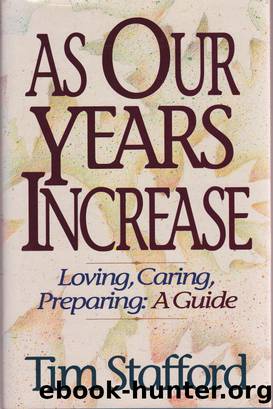As Our Years Increase by Tim Stafford

Author:Tim Stafford
Language: eng
Format: epub
Tags: family, christian, elder care, aging
Publisher: Tim Stafford
Slowing Down or Getting Sick?
None of these losses means that an older person is sick or helpless. In mild doses, at least, all these losses can be compensated for. And they are. Older drivers tend to become more careful, for instance, and may have fewer accidents than younger drivers, even though their reactions are slower.
Making compensations, however, puts stress on an older person. People under stress, at any age, are brittleâ more likely to become angry or depressed or to act irrationally. And when a health crisis comesâa fall, a bout with influenza, a car accidentâits effects are likely to be far more devastating to an older person than to a younger one.
One gerontologist has put this rather graphically in comparing two cavemen, old Urk and young Murk. So long as life proceeds benignly, Urkâs age may make very little difference, even though he has âslowed down.â In fact, his greater experience may give him an advantage over Murk in gathering nutritious plants. But suppose a saber-toothed tiger attacks. Then, under drastic stress, Urkâs slower responses will make a dramatic difference in survival. Under conditions without stress, older people may function as well or better than younger people. In a crisis, they donât. Nobody dies of old age, but old age makes a person more vulnerable to forces that can kill or cripple.
There is one bright spot in this portrait of vulnerability: A personâs mental abilities do not, fortunately, decline. The body may crumble, but the mind usually does not. Older people tend to lose some short-term memory, but they can make allowances for this with more careful routines and habitsâalways checking the stove when they leave the kitchen, for instance. Overall, intelligence holds its own throughout life, and it may even increase, particularly for those who keep their minds stimulated.
Since so many of the elderly worry about losing their minds, this is very good news indeed. A small proportion of seniors, particularly those who live into their eighties or nineties, will develop Alzheimerâs or other conditions that lead to senile dementia. But these problems are utterly different from âforgetting your keys.â Forgetfulness is a minor annoyance, usually completely unrelated to any major health problem.
One factor does block learning for older peopleâ anxiety about appearing foolish or making mistakes. Studies show that when seniors are in a comfortable and secure environment, they tend to perform far better than when they feel exposed to failure. Seniors need encouragement to use their undiminished intelligence to cope with the tremendous changes of the Fourth Day. If they feel confident and secure, they will be more likely to succeed.
Download
This site does not store any files on its server. We only index and link to content provided by other sites. Please contact the content providers to delete copyright contents if any and email us, we'll remove relevant links or contents immediately.
| Administration & Medicine Economics | Allied Health Professions |
| Basic Sciences | Dentistry |
| History | Medical Informatics |
| Medicine | Nursing |
| Pharmacology | Psychology |
| Research | Veterinary Medicine |
Periodization Training for Sports by Tudor Bompa(8272)
Why We Sleep: Unlocking the Power of Sleep and Dreams by Matthew Walker(6725)
Paper Towns by Green John(5191)
The Immortal Life of Henrietta Lacks by Rebecca Skloot(4588)
The Sports Rules Book by Human Kinetics(4386)
Dynamic Alignment Through Imagery by Eric Franklin(4217)
ACSM's Complete Guide to Fitness & Health by ACSM(4060)
Kaplan MCAT Organic Chemistry Review: Created for MCAT 2015 (Kaplan Test Prep) by Kaplan(4012)
Livewired by David Eagleman(3774)
Introduction to Kinesiology by Shirl J. Hoffman(3770)
The Death of the Heart by Elizabeth Bowen(3622)
The River of Consciousness by Oliver Sacks(3604)
Alchemy and Alchemists by C. J. S. Thompson(3521)
Bad Pharma by Ben Goldacre(3428)
Descartes' Error by Antonio Damasio(3279)
The Emperor of All Maladies: A Biography of Cancer by Siddhartha Mukherjee(3163)
The Gene: An Intimate History by Siddhartha Mukherjee(3098)
The Fate of Rome: Climate, Disease, and the End of an Empire (The Princeton History of the Ancient World) by Kyle Harper(3067)
Kaplan MCAT Behavioral Sciences Review: Created for MCAT 2015 (Kaplan Test Prep) by Kaplan(2986)
